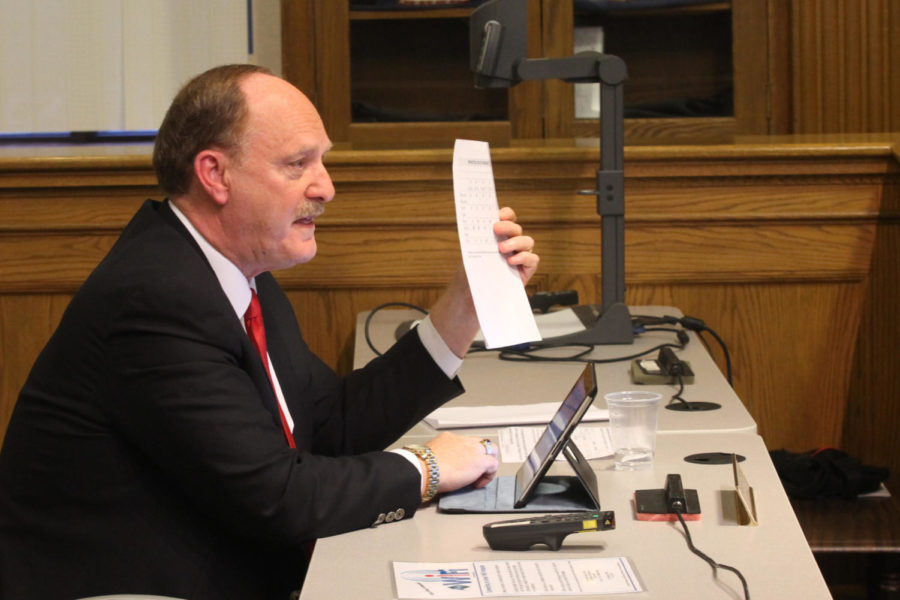Rooted in contention: Ordinance has divisive history with housing stakeholders
Steve Schainker discusses a broad overview of the research park at the City Council meeting on April 1, 2014. Shainker has served as city manager for more than 30 years.
November 6, 2017
In a string of letters to the editor published in the Iowa State Daily in 2003, students expressed deep discontent for Ames’ recent decision to aggressively enforce over-occupancy housing code violations.
“I believe this is another example of how the city cruelly treats the college students here,” one senior wrote. “After my experience, I want to get as far away from this city as possible.”
The issue of rental-housing occupancy is something that has existed for years in Ames, as students at Iowa State have looked to move in and rent houses in the neighborhoods that surround campus.
The city ordinance – that has been around since the 1970s — was that no more than three unrelated people could live in a house together.
Over the years, the issue of enforcement has resurfaced, such as in 2002 when Ames City Council passed an ordinance that they would fine tenants and landlords who are in violation of the housing code.
“Before the city of Ames bites the hand that feeds it, I would consider easing some of the student-complicating ordinances that only promote tension between the “townies” and the students,” an alumnus wrote. “After all, Ames is still a college town.”
From a neighborhood perspective, however, the ordinance served as a form of protection, stability and investment to the community.
“Students might not agree with the city’s zoning ordinance, but they can protect themselves if they know what it is,” three neighborhood associations wrote in a letter to the Daily.
Steve Schainker has been the city manager of Ames for 35 years and in his time here he understands that how people view the ordinance depends on their perspective.
“It was a rational basis on deciding how many could be in a rental unit,” Schainker said. “Depending on your viewpoint you can see it as more or less effective.”
Some have questioned whether this issue is best left to the city to handle or if it’s the responsibility of the university.
“It’s for both of us. It’s on the city to maintain neighborhoods and it’s our job to figure out ways, pass laws, to make sure those are livable neighborhoods.”
Schainker said the university’s role is in determining how much housing it will make available for students on campus, which then drives how many students need to rent houses in Ames, among the other options.
Over the years, Schainker said another top concern for the city has been to provide housing that is as safe as it can be for those living there.
“Government gets involved to protect the third party, the tenants,” Schainker said. “We have to create health and safety standards and make sure they’re met so that tenants are protected.”
In February 2004, the Ames Rental Property Association filed a declaratory judgement in Story County — which determines the rights of parties without ordering anything to be done — requesting the Ames Municipal Code definition of “family” be declared “in violation of the equal protection clauses.”
The city, according to a Supreme Court of Iowa case, denied the allegations. The Ames Rental Property Association filed an appeal.
And in July of 2007, with a contested vote of 4-3, the Supreme Court of Iowa ruled the Ames ordinance “is rationally related to the government’s interest in providing quiet neighborhoods.” Additionally, “it does not offend the equal protection clause of the Iowa Constitution or the United States Constitution.”
“Certainly this ordinance is imprecise and based on stereotypes,” the Supreme Court of Iowa wrote. “Nevertheless, it is a reasonable attempt to address concerns by citizens who fear living next door to the hubbub of an ‘Animal House.’”
After being found constitutionally sound, the occupancy ordinance would again fall to the wayside. That is until Rep. Chip Baltimore, R-Boone, introduced legislation in 2011 stating Iowa cities cannot limit occupancy in rental housing based on familial status.
It wasn’t until 2017, however, in a Republican-controlled state Legislature that he was able to successfully push House File 134 through.
Former Gov. Terry Branstad signed the legislation into law this past spring. The House file states a city shall not, after Jan.1, 2018, adopt or enforce any regulation or restriction related to the occupancy of residential rental property based upon the existence of familial or non-familial relationships between the occupants of such rental property.
Here lies the issue the city currently faces: What should Ames do next?
“The talks now are, do we want to put any limits on, and if they do what would you limit? Will it be based on whether you’re related or not. Should we do it to a set number? These are just a few options we can propose to City Council,” Schainker said.







